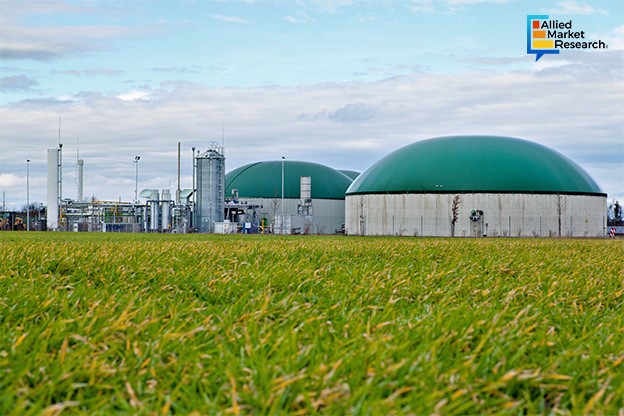Decarbonizing the Economy: The Role of Biogas in Sustainable Energy Solutions

12 Jul
2024
Highlights:
- A brief on biogas
- Key role of biogas across different fields
- Europe’s first biogas production line
- Profitable acquisitions by industry leaders
With the growing demand for sustainable and renewable energy sources, biogas has emerged as a versatile and eco-friendly alternative to fossil fuels. This renewable energy source is derived from organic waste, offering a dual benefit of waste management and energy production. At present, energy security and environmental degradation are two major challenges before the world. Biogas, with its advantageous potential, has come out as a promising solution that addresses both the issues simultaneously.
Understanding biogas
Biogas is a mixture of gases, primarily CH4 (methane) and CO2 (carbon dioxide), produced through the anaerobic digestion of organic matter by microorganisms. This organic matter includes agricultural waste, manure, municipal solid waste, sewage, food waste, and other biodegradable materials. The anaerobic digestion process occurs in an oxygen-free environment, typically within a biogas digester or an anaerobic reactor.
Analyzing the economic and environmental impact of biogas across leading sectors
Biogas offers many applications in different fields, ranging from energy generation to agricultural enhancements, providing numerous economic and environmental benefits. This renewable source of energy plays an important role in electricity generation. This gaseous renewable energy source is used to generate electricity through CHP (combined heat and power) systems, which simultaneously produce electricity and useful heat from the same energy source. These systems are highly efficient and are suitable for various scales, from small farms to large industrial setups. The electricity generated is supplied to power grids, offering a reliable source of sustainable energy.
Moreover, this organic raw material is also used as vehicle fuel. It is chemically upgraded to biomethane and is used to create CBG (compressed biogas), a renewable alternative to CNG (compressed natural gas). CBG powers vehicles, including cars, buses, and trucks, offering a cleaner alternative to diesel and gasoline. It reduces greenhouse gas emissions and air pollutants, improving air quality. For heavy-duty and long-distance transportation, biogas is also processed to produce LBG (liquified biogas), suitable for trucks, ships, and trains.
In the agricultural sector, biogas production provides an effective waste management solution for various operations in this field. Manure and crop residues are processed in biogas plants, reducing waste volumes, minimizing odors, and preventing the contamination of water bodies. Also, it is used to produce bio-fertilizer, called “digestate”, a byproduct of the anaerobic digestion process. This organic fertilizer is rich in nutrients and enhances soil fertility, improves crop yields, and reduces the need for chemical fertilizers. It also helps in soil moisture retention and reduces nutrient runoff, contributing to sustainable agriculture.
A combined initiative to launch the first biogas production line in the European sector
Several leading players in the biogas industry have come up with innovative product launches to boost the industry’s competitiveness. In March 2024, PRODEVAL, a leader in Biogas treatment, AVENTECH, a European leader in the design, industrialization, and manufacturing of critical electrical/industrial equipment and INSA Lyon, A France-based engineering school came together to offer decarbonized and sustainable industrial solutions in the energy sector. The entities aimed to create a new production line for Biogas upgrading units and CO2 liquefiers by the end of 2024. Through this project the companies envisioned to address the major challenges related to greenhouse gas emissions reduction and contribute to the energy sovereignty of territories. The new production line aims to manufacture nearly 450 units per year, compared to the current 150 units. This unprecedented production capacity will enable the sector's structuring and standardization to deploy solutions across various territories such as Europe.
Repsol and Genia Bioenergy join forces to revolutionize Spain’s biomethane industry
In April 2024, Repsol, a Spanish multinational energy and petrochemical company based in Madrid entered the biomethane industry with an agreement to take a 40% shareholding in Genia Bioenergy, a leading engineering company that designs, manages, and implements biogas and biomethane projects. The agreement between Repsol and Genia Bioenergy included 19 of their biomethane plants and 11 other projects. Through this agreement, Repsol aimed to purchase all the gas produced by these projects to form a unique platform for creating agro-industrial ecosystems capable of boosting local economies and offering solutions for the valorization of their waste.
For Repsol's executive managing director of Industrial Transformation and Circular Economy, Juan Abascal, this agreement is an important step for the company to take advantage of material that would otherwise be waste and transform it into fuels for the home, industry, and mobility. In addition, Gabriel Butler, the CEO of Genia Bioenergy, said that the development of biomethane plants played a big role in advancing Spain's goal of decarbonization of the economy, reducing its energy dependence on foreign countries and providing a sustainable response to European guidelines on waste management.
Wrapping up, biogas offers an eco-friendly and versatile solution to overcome the emerging challenges in the modern world. By converting organic waste into valuable energy and reducing greenhouse gas emissions, it contributes to a cleaner, greener future. Moreover, with its potential benefits, biogas is set to play a key role in the global transition to a sustainable and circular economy.
To gain more insights into the biogas industry, feel free to talk to our industry experts today! They will help you identify and mitigate risks associated with investments.

Rosy Behera
Author's Bio- Rosy Behera holds a bachelor’s degree in Electrical and Electronics Engineering and now she is a content writer by profession. She loves to portray her thoughts and ideas with a nice command of words. Grabbing an audience with her creative write-ups is one of her biggest assets so far. Apart from writing, she is a certified “Odisi” dancer and has done Gardharva in Drawing, Painting, and Arts. She always explores new things through travel and is a big foodie.
Avenue: Entire Library membership of Allied Market Research Reports at your disposal
- Avenue is an innovative subscription-based online report database.
- Avail an online access to the entire library of syndicated reports on more than 2,000 niche industries and company profiles on more than 12,000 firms across 11 domains.
- A cost-effective model tailored for entrepreneurs, investors, and students & researchers at universities.
- Request customizations, suggest new reports, and avail analyst support as per your requirements.
- Get an access to the library of reports at any time from any device and anywhere.
Related Post
-
How are Submarine Cables Transforming Global Connectivity with Enhanced User Experience?
-
Endoscopy Procedures: Transformations in Techniques and Applications
-
AI-Powered Video Analytics: How the Product Actually Works for enterprises
-
Painting Robots: Transforming Precision Coating and Creative Applications
-
Innovations in Pharmacovigilance Systems Advancing Patient Safety
-
Understanding Edge Security: Keeping Data Safe Near the Source
-
Exploring the Use and Advancements of 3D Laser Scanners in Professional Applications
-
Reinforcing Industrial Controls with Smarter Tools and Training








